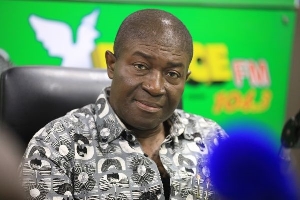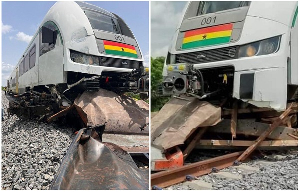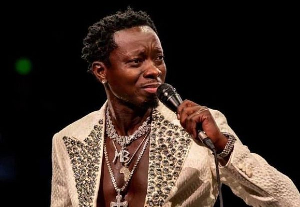Opinions of Friday, 20 December 2013
Columnist: Amponsah, John
Was Akuffo-Addo right in prioritizing free education?
By John Amponsah
Those who are familiar with previous articles I have written may know that I try to avoid politically charged writing and partisanship. Yet there are times when one must consider carefully the arguments of one party or the other, since after all, the current Ghanaian political atmosphere is effectively bipartisan in nature and as such the mainstream engine of change comes from one or the other political group. So, although I shall declare a stand by the end of this article, I intend to have such a stand reflect the arguments made and not be an instance of blind loyalty to a political party. I entreat readers to consider reading the article first before making up their minds or making any random comments simply because of political affiliation.
Before plunging in, let us admit to ourselves that modern Ghanaian education (and indeed modern education the world over) is largely based on Euro-American traditions of education. This is a fact. It is also historical fact that the Christian missionaries were instrumental in setting up the education system in what is now Ghana. The Basel (Presbyterian) and Wesleyan (Methodist) missionaries in particular, as well as several other denominations, were instrumental in propagating modern (Western-style) schooling in Ghana and they founded some of the most well known schools in the country.
The British colonial administration followed a “laissé faire” approach, preferring not to get involved in implementing mass public education and instead allowing an environment for private interests (some assisted and some not assisted) to provide education for the people. This followed British colonial policy of reluctance to get directly involved in the education of the locals (with a few exceptions such as the case of Achimota school, which was in large part a colonial experiment). A consequence of this was that in 1950, six years before Ghana gained independence only 6.6% of the total population of school-going children were in school. One estimate has it that at the rate at which schools were being provided during the colonial era, it would have taken 600 years (of rule Britannia) for mass education to have been provided for school going children, if ever it would have, using population and school numbers from 1950. Kwame Nkrumah understood this. After independence, Kwame Nkrumah realised the need to have a well educated population so much of the country’s resources were spent building new schools at all levels. The following quote was taken from an address Nkrumah gave two days before independence:
“We must seek an African view to the problems of Africa. This does not mean that western techniques and methods are not applicable to Africa. It does mean, however, that in Ghana we must look at every problem from the African point of view … Our whole educational system must be geared to producing a scientifically-technically minded people. Because of the limitations placed on us, we have to produce, of necessity, a higher standard of technical education than is necessary in many of the most advanced countries of the Western world” (Quoted from Dr. Akyeampong’s 2007 article)
What Nkrumah envisioned above is exactly what the "Asian Tigers" have done, especially if one focuses on the last line of that quote above. Today, if you look at international data such as PISA and TIMMS comparing the performance of school-going children in many countries, you'll find Ghana among the bottom nations while Asian locales such as Singapore, Taiwan, South Korea, Japan and Hong Kong are blazing at the front. It should come as no surprise. These countries invested heavily in the education of their school-going population. Leadership was absolutely essential.
Singapore under Lee Kwan Yew (perhaps a bit of a “benevolent dictator”) had at least three stages of education in which the education of the population was tied in with the economic development of their territory. In less than 50 years, their territory went from a place of majority illiteracy to doing better than the systems they learned from. Throughout this period, leadership was paramount, the making and the execution of policy was sound and the Singaporeans used a feedback system of global benchmarking to inform the performance of their schools. A lot of time, money and true effort got put into making this happen.
A similar story can be told of South Korea, where the country and the people made massive sacrifices under powerful and purposeful leadership of General Park Chung-hee (perhaps another “benevolent dictator”) and his successors who with an almost exclusive focus on economic development, managed to propel themselves from poverty and illiteracy into wealth in abundance through a synergistic interplay of politics, economics and education.
Japan was devastated after the Second World War however their education system, tied in with economic development, managed to turn their fortunes around in only a few decades. Today, they have one of the best education systems in the world, where public education in elementary and lower secondary school is FREE (most parents still have to provide things like lunch) and where 99% of their school going children are in school and not playing in gutters or on rubbish dumps.
Similar stories can be found elsewhere in many other countries which took pains to invest heavily in the education of their people at the nascent stages of their nations and continued to prioritize education to this day. Countries like Finland, the Netherlands, South Korea, Singapore and Japan (to mention only a few) choose their teachers from among the best students graduating from their Universities and these professionals are well taken care of by the state. Teachers in these countries are highly valued, well paid and receive quality training and several other perks and as a result, the teaching profession is made as prestigious as architecture, law, medicine and other professions. Teachers are (mostly) well taken care of by the state, and top performing university graduates are recruited into teaching. In some countries such as Singapore and South Korea, only the top 5-10% of university graduates can teach certain subjects in schools. Japan in particular has an awesome elementary education system where apparently a Masters degree is often required to teach at the elementary level. I am afraid we may be seeing the reverse in our own country.
For what is gained, something may be lost, but if done wisely, mass education can be empowering, rather than disempowering. Colonization changed our society and our identity. Colonization is imprinted upon our national identity. Mass education has the potential to move us even further away from our traditions and our African identity. We may still have a choice in education. Nkrumah seems to have had the right idea in saying that "We must seek an African view to the problems of Africa". The education system in Ghana, if it receives high priority and is guided by enlightened leaders, can potentially propel us into our own, past the legacy and the vestiges of colonization.
Today, we not only have Western educational models to look at but also those of countries in other regions, including the Asians, Latin America and even Cuba. Education tied in with sustainable economic development in a stable political environment, considering the best of what is available today the world over and adopting what can work for our situation will be the ideal situation.
Ironically, it seems we are once again at a similar stage of opportunity as the time of Nkrumah after independence. Once again today we can make big changes, after a period of relative political stability in the country (1981 – 2013). Nkrumah was a visionary leader, but unlike his Asian counterparts at the time who perhaps realized their weaknesses and so chose to buckle down to focus on building the economic power of their nations, Nkrumah got overly involved in political rhetoric on the world stage, making powerful speeches at the UN and extending out of Ghana into other countries and territories on the continent. The content of his words were on point but perhaps the timing was not (arguably). By taking on the world and falling right into the cold war struggles of the US and the USSR, he became a real threat to the true post World War 2 Western power, the US. So, along came the CIA to "do their thing" in collusion with some local groups, and the rest, as we say, is history.
Much has expanded in the way of government schools since independence but not at the same rate and with the same commitment as during Kwame Nkrumah's time, when there was an explosion in government provision of public education following the failings of the British colonial establishment. Perhaps as a consequence of years of unstable political and economic environment in the post-Nkrumah years (the coup d’etat years), the education system of the country got less attention from the government than it did during the immediate post-independence era.
There are now many public schools in the country at all levels but there should be more and the quality should be much higher. What has occurred instead is that public schools are largely failing to adequately educate school-going children while private schools are booming and doing just the opposite. So although there are many schools in the country, at the primary and JHS levels only a few students from public schools the country over get high enough aggregates to enter the comparatively few elite senior high schools in the country. What happens the rest who fail at the JHS level, largely as a result of the public school system? Also, it turns out that of those SHS students entering the country’s public universities, most are from the comparatively few (elite) high schools in the country. In other words, the public school system at the primary and JHS level is failing to adequately meet the educational needs of the majority of school-going children. Parents who have realized this opt to send their children to private primary and JHS institutions which charge significantly higher fees than those of the public schools. In Ghana it is now the case that if your child does not attend a good school, their chances of succeeding in life will be much lower and it also happens that at present most of the good primary and junior high schools are private, so unless one sets aside or finds money to privately fund education for a child, that child’s chances of a brighter future are dim.
Also, it seems as if very little has changed. Research carried out by Professors Addae-Mensah, Agbenyega and Djangmah in 1973 when the common entrance system was still in place showed that even at that time there was great competition to get into the few top high schools in the country because those were places that provided access to a better future. Again in the year 2000, Professor Addae-Mensah (then the vice chancellor of UG) carried out further research which showed that the situation had got even worse, meaning that the BECE mostly gave students only one chance to make it to high school, or fail. Very few school-going children from the public schools around the country were making it into these few elite schools – it was instead those from private schools. If we had an all-round good and thriving public school system in the country at the primary and secondary levels, this would not have been the case.
So, a natural question to ask is: what has changed in the last 13 years since Professor Addae-Mensah’s publication in 2000? Well, there are now more public as well as more private JHS, SHS and tertiary-type institutions to provide more options for school-going children, yet it seems the private schools still outperform the public ones and that by and large the old trends still remain.
So, the short answer to the question I posed in the title of this article is that in my view, it appears that Akuffo Addo may have been right. However, talking about free schooling and actually implementing it are two completely different things. Had Akuffo Addo won the election, would the NPP have stayed true to their promise to make education free up to SHS or would he have reneged on his promise? Perhaps, or perhaps not! Is it possible to do what he was proposing? Yes, because there are historical examples of similar measures at different levels of childhood education having taken place in countries like Canada, The Netherlands, Japan, Singapore and South Korea. So it is possible, with the right political will and leadership.
Some may also argue that the way the NPP propose(d) to fund education is not workable, and perhaps that may be true. Or it could be that in the process of modernizing the nation with education and industrialization, the NPP may sell off the country to imperialist partners. And so on. Whatever the case may be, the bottom line is that as a country, we do not have a viable nation-wide public education system that adequately caters to the needs of all school-going children. That is a fact. SO WE NEED TO TALK ABOUT, THIS AS A NATION! It is even arguable that we never have had such a system in place. So in my opinion it was a revolutionary act for the leading politician of one of the two major political parties of the country to put education at the forefront of political priorities, whether or not such talk was true talk. As far as I am aware, such a major push by a major politician has not happened since the time of Kwame Nkrumah, over half a century ago.
Does the NDC have an education policy? Of course they do! Theirs is known as the "Education Strategic Plan (ESP)" which is a 2010-2020 plan and is part of the NDC government's "Better Ghana Agenda". But at the moment, it seems they are in 'maintenance' mode, not in 'revolutionary' mode, at least as far as education is concerned. It doesn't seem as though education is at the forefront of their political agenda, although much is still being done in the Education sector. The 2010 Ministry of Education Performance report has a lot of numbers on enrolment and completion rates and not quite as much on percentages of higher and lower performance (someone kindly correct me if I am wrong). There have been increases in the number of schools built but equally important is what happens in these schools to produce successfully prepared students as they move on in life. I know it takes time for these changes to occur, especially giving that they are occurring in an economically developing country, however the point I want to make in this paragraph is that an aggressive focus on prioritizing education will ultimately pay off greatly. It will be great to see the NDC have education genuinely at the forefront of political priorities.
What is ultimately the important point of focus in this article (the bottom line) is that without widespread quality education that reaches out to all the young people of the country, as a nation, we will be unable to fully harness the human capital of the citizenry, in a way that can optimally propel the nation forward. We will remain more as we were in the past and as we are now, and less as we could be, in the future.
So to sum up, it seems that we are currently presented with a choice spectrum of how things are right now and what things could be, at a future time:
(1) At one end of the spectrum (how things are right now), we have an educational system that is essentially highly elitist in orientation rather than being one that serves the educational needs of the majority of school going children. Country-wide, public education is at best inadequate for the most part (with some children studying under trees in some parts of the country) and especially at the early childhood development stage (kindergarten, primary and JHS levels). Provision of higher quality education has increasingly become the purview of those with the financial means (or those without them but who sacrifice other aspects to provide this means). The fortunate ones get selected into the handful of successful elite secondary schools (compared to the number in the entire country) who provide the best opportunity for further education at the tertiary and other levels, providing a better opportunity of getting jobs in business/industry, in government or in academia. The vast majority of unfortunate students (products of the inadequate public school system at the primary and JHS levels) fail to make the required aggregates to successfully proceed further and hence effectively end their schooling without getting into secondary school or into tertiary institutions. These young citizens, members of the Ghanaian community, probably end up on the streets selling dog chains or 'pure water', wiping the screens of the cars of those with higher socioeconomic status, selling foodstuffs, working as maids or 'house boys' in the homes of the more affluent or doing 'kakayo' in markets, or if they are fortunate, in some kind of artisan, technical or small scale business enterprise in kiosks, or perhaps they even revert to survival at the subsistence level, through farming or fishing to make ends meet. The truly unfortunate, they may end up in crime or in some other nefarious activities.
Or, at the other end of the spectrum (how things could be),
(2) Carefully planned government provision of mass, subsidized and supported African-centred education to solve African problems (Kwame Nkrumah's dream) in tandem with already existing provision of private education tied into a viable and sustainable economic development plan that invests heavily in industry and that channels the products of the education system into a job market that is hungry for the skills of such graduates. The educational system then becomes a major engine of socioeconomic change and hence a major asset of the nation and of the people. Such an educational system is highly valued by the community and treated as such and hence great care is taken to maintain it, to obtain the best possible employees for the educational system and to take very good care of these employees (i.e. teachers especially, but other stuff as well). The educational system is given a high priory, just as the economic system is, because the two work hand in hand. Such educational and economic systems will require a suitably positive and supportive political environment where politicians understand the value of education to the economy and indeed to maintaining the social order.
Well, perhaps it is our lot to be stuck with option (1) above however it need not be so. The educational system must have an important place on the political agenda, just as the economy has, since as we have seen time and time again in other successful countries, the two end up working hand in hand. So the choice is ours.












